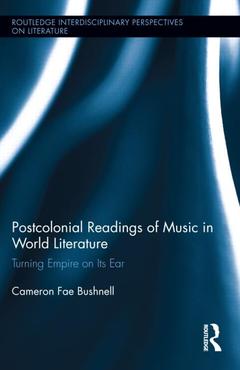Postcolonial Readings of Music in World Literature Turning Empire on Its Ear Routledge Interdisciplinary Perspectives on Literature Series

This book reads representations of Western music in literary texts to reveal the ways in which artifacts of imperial culture function within contemporary world literature. Bushnell argues that Western music?s conventions for performance, composition, and listening, established during the colonial period, persist in postcolonial thought and practice. Music from the Baroque, Classical, and Romantic periods (Bach through Brahms) coincides with the rise of colonialism, and Western music contains imperial attitudes and values embedded within its conventions, standards, and rules. The book focuses on the culture of classical music as reflected in the worlds of characters and texts and contends that its effects outlast the historical significance of the real composers, pieces, styles, and forms. Through examples by authors such as McEwan, Vikram Seth, Bernard MacLaverty, Chang-rae Lee, and J.M. Coetzee, the book demonstrates how Western music enters narrative as both acts of history and as structures of analogy that suggest subject positions, human relations, and political activity that, in turn, describes a postcolonial condition. The uses to which Western music is put in each literary text reveals how European art music of the seventeenth through the nineteenth centuries is read and misread by postcolonial generations, exposing mostly hidden cultural structures that influence our contemporary understandings of social relations and hierarchies, norms for resolution and for assigning significance, and standards of propriety. The book presents strategies for thinking anew about the persistence of cultural imperialism, reading Western music simultaneously as representative of imperial, cultural dominance and as suggestive of resistant structures, forms, and practices that challenge the imperial hegemony.
1. Introduction: Beyond Contrapuntalism: A Politics of Alterity in World Literature Part I: The Amateurs 2. Borrowing from History, History from Borrowing: Opera on Banjo in J.M. Coetzee’s Disgrace 3. Subjectivity and the Genre of Nocturnes in Chang-rae Lee’s Gesture Life 4. Music, Muteness, and Listening in Hulme’s the bone people and Campion’s The PianoPart II: The Virtuosi 5. (De-) Composing the Nation: Noise,Ornamentation, and Repetition in McEwan’s Amsterdam and MacLaverty’s Grace Notes 6. The Art of Tuning: A Politics of Exile in Mason’s The Piano Tuner and Seth’s An Equal Music 7. Articulation and Allegory in Rushdie’s The Ground Beneath Her Feet 8. Coda
Date de parution : 12-2012
15.2x22.9 cm
Date de parution : 05-2017
15.2x22.9 cm
Mots-clés :
Research; Literature; Music; Musicology; Postcolonial; Young Man; Chopin; Lambeg Drums; Vice Versa; Cantus Firmus; Piano Tuner; EU Flag; European Art Music; Postcolonial Subjectivity; Western Music; Western Musical Form; Equal Temperament Tuning; Intersubjective Ethics; Chamber Opera; Grace Notes; Musical Articulation; Equal Temperament; Gesture Life; Bone People; Double Consciousness; Contemporary Society; Nadine Gordimer; Gluck’s Orfeo Ed Euridice; Korean Comfort Women; Ethical Dyad



